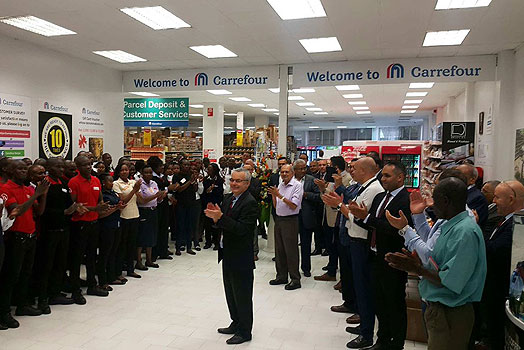Majid Al Futtaim, the operator of Carrefour’s supermarket franchise in Kenya, has seen its business model brought under the spotlight again after it was slapped with a record Sh1.1 billion fine by the competition watchdog on Tuesday.
The retailer’s operating model of demanding substantial discounts from suppliers first came to light in April 2019 when Orchards Limited, a yoghurt supplier, complained to the Competition Authority of Kenya (CAK) over the requirement to pay a listing fee of Sh50,000 for each product sold in its stores.
Following investigations, Carrefour was slapped with a fine of Sh124,768 calculated at 10 percent of gross revenues from the sale of the supplier’s products in addition to the reimbursements of rebates and losses from the termination of the supplier’s agreement.
Carrefour objected to the determination and appealed the matter to the Competition Tribunal before escalating the matter to the High Court after an adverse outcome at the tribunal level.
The new Sh1.1 billion fine is grounded on similar complaints with Woodlands Company Limited and Pwani Oil products lamenting the demand for rebates, listing fees and the posting of employees to man the retailer’s shelves.
The complaints filed in August and December 2022 respectively further open the lid on the operations of the Majid Al Futtaim-owned retailer and its relationship and contracts with suppliers, which the competition watchdog finds to be lopsided.
According to suppliers, Carrefour employs three types of rebates –fixed and royalty rebates and progressive rebates.
The first pair of rebates is usually charged monthly at a percentage set by the retailer irrespective of sales/turnover while progressive rebates are charged annually with the rate charged being adjusted annually.
The rebates have enabled Carrefour to hand down significant discounts to shoppers but at the expense of supplier margins and profits, an outcome corroborated by the CAK’s findings.
“It’s like a noose on suppliers, and each year, they tighten the noose further. We struggle to pass the same cost to consumers as customers are very price-sensitive. The rebates are eating away supplier margins and this is a way of margin erosion,” Association of Kenya Suppliers CEO Ishmael Bett said in a previous interview.
Following the complaints by Pwani Oil, Carrefour terminated its dealings with the manufacturer despite there being a negotiation process intermediated by the CAK.
The retailer also failed to amend its contracts with other suppliers to remove clauses amounting to abuse of buyer power despite orders to do so.
Buyer power means the ability of a purchaser to extract more favourable terms from a supplier on whom it can also impose significant opportunity costs by, for example, delaying payments.
Carrefour has an estimated 4,000 suppliers and has had five complaints against it handled at the competition watchdog with the limited number of complaints being linked to fear by suppliers over the termination of contracts.
The CAK says Carrefour has likely relied on rebates and other forms of discounting to grow its operations in Kenya.
“The retailer seems not to cease or desist from the audits of the Authority and hence the repeat cases. Rebates could be one of the ways to grow their market share,” noted CAK Acting Director Adano Wario.
In its defence, Majid Al Futtaim has termed its operations as standard industry practice enabling Carrefour to deliver affordable and quality services.
Nevertheless, Carrefour supermarkets have attracted anti-competitive fines based on similar supplier complaints in other markets, including Korea and France.
In 2006, for instance, the retailer was fined Sh230.5 million ($1.5 million) for allegedly forcing suppliers to discount supplied goods and bear advertising costs even as the fine was later reversed in court.
Meanwhile, in 2021, the retail chain was fined Sh295.6 million (1.75 million Euros) for unfairly pressing suppliers for discounts during annual contract negotiations.
In Kenya, Carrefour had opened 20 outlets as of July, placing it among the major formal retailers.
Naivas remains the leading retailer by branch network having 100, ahead of Quickmart with an estimated 59, Chandarana with 26 and Cleanshelf with 10.
According to disclosures by Majid Al Futtaim, the retailer’s operations in Kenya generated revenues of Sh48 billion (1.145 billion UAE Dirhams) in 2022 while total assets were recorded at Sh16.9 billion (403 million UAE Dirhams).
Tuesday’s Sh1.1 billion fine was the highest handed down by the CAK in its enforcement history and trounces July’s Sh338.8 million fines to steel manufacturers over price fixing.


 Business2 weeks ago
Business2 weeks ago
 News1 week ago
News1 week ago
 News2 weeks ago
News2 weeks ago
 Business2 days ago
Business2 days ago
 News1 week ago
News1 week ago
 News1 week ago
News1 week ago
 News1 week ago
News1 week ago
 Investigations1 week ago
Investigations1 week ago













